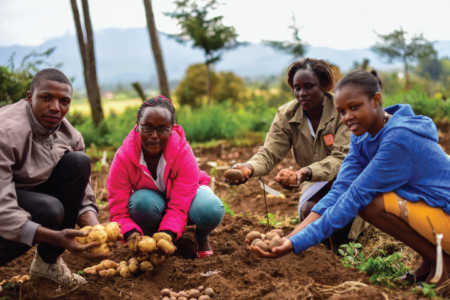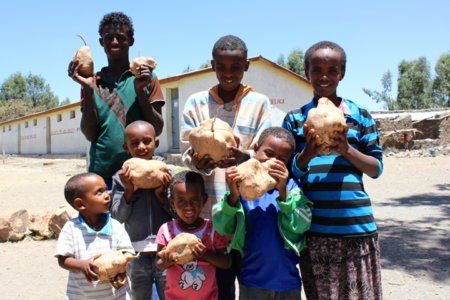
Expanding access to quality seed for better potato harvests using apical rooted cuttings
This project boosted the seed potato productive sector in India’s Meghalaya state by introducing apical root cutting technology and training local officers, seed entrepreneurs and farmers in quality seed production and storage. At the same time, farmers got access to early-yielding, stress-tolerant and biofortified potato varieties with improved storability. Increasing local potato productivity has opened possibilities for Meghalaya to become an exporter of seed potatoes to neighboring regions.
Background
In the state of Meghalaya, India, favorable agroecological conditions offer the possibility to produce at least two potato crops per year. However, potato yields in Meghalaya are less than half the country average, due to constraints including a lack of quality potato seeds of varieties able to resist drought, heat, pathogens such as late blight and viruses – problems that are exacerbated by climate change. At the same time, a lack of adequate postharvest handling and storage causes postharvest losses. All this threatens the food security of small-holder farmers.
This project aimed to accelerate the production of quality planting material using low-cost apical rooted cuttings as starter material for seed potato production. This innovative technology reduces the time needed to produce commercial seed, boosting the profitability of seed multiplication and the supply of quality seed available for farmers. Coupled with the adoption of early maturing, stress-tolerant varieties and/or biofortified varieties and with better storability characteristics, apical rooted cuttings represent an option for increasing formal and informal production of quality seed, which can improve local livelihoods and food security. In the long run, there is potential for Meghalaya to become a seed production hub that supplies quality potato seed to the whole North-East region, including Assam and adjoining states, once local demand is met.
Objectives
The overarching objective of this project was to support the IFAD-funded ‘Meghalaya Livelihoods and Access to Markets Project’ (Megha-LAMP), implemented by the Meghalaya Basin Management Agency (MBMA), by improving the state’s potato industry and the incomes of small-scale and marginal farmers. This included following specific objectives:
- To develop Meghalaya’s potato seed value chain by introducing the low-cost apical rooted cutting technology;
- To improve potato productivity in the state;
- To enable production of quality seed potatoes for neighboring states at affordable prices;
- To introduce new early-bulking and -maturing (70-80 days from planting to harvest) potato varieties with good tolerance of heat, drought and pathogens and with characteristics that consumers and industry demand; and
- To introduce nutritient-rich, early-maturing varieties with better storability to reduce malnutrition.
Approach
In this project, CIP served as a technical partner supporting the IFAD-funded Megha-LAMP/MBMA/DoH project. Farmers selected by MBMA staff were involved in participatory evaluations of potential potato varieties for home consumption or processing in different seasons and locations. The most promising varieties were tested under local planting and storing conditions to choose the best performing candidates for state-level release as varieties.
CIP staff were responsible for identifying suitable areas near villages suggested by Megha- LAMP/MBMA for seed production in different seasons, based on agroecological conditions and disease pressure, using GIS, remote sensing, and ground surveys.
The seed potato production system implemented begins in tissue culture labs, where apical cuttings are produced from disease-free, in vitro plantlets and transferred to net houses, where they develop root balls, upon which they are transferred in open fields for production of early generation seed potatoes. Those are planted in the fields of specially trained and registered farmers to produce commercial seed potatoes.
The project team produced gender-sensitive training materials for farmers and value chain actors on quality seed production and storage, including integrated seed health management and the participatory market chain approach for certified seed potatoes. Seed storage capacity was developed with the help of the local partners. Linkages with seed companies for sale of seed potatoes within and outside the state were established
Outcomes
Farmers in the state of Meghalaya are benefitting from a steadily growing supply of locally produced, high-quality seed potatoes, product of the relatively low-cost apical cutting technology. This is increasing potato productivity, strengthening food security, and improving livelihoods by providing new income generation alternatives to local entrepreneurs and small-scale of marginal farmers.
It is facilitating the dissemination of recently introduced, early maturing, stress-tolerant and/or biofortified varieties
with improved storability. In combination with farmer training in best seed production and storage techniques,
this is contributing to climate change adaptation, improving nutrition and reducing postharvest losses.
It is hoped that improved seed quality and productivity, and enhanced human capacity obtained through gender-sensitive trainings will position Meghalaya state as the quality seed production hub in India’s northeastern hill region within 5 years, enabling seed producers to meet the state’s demand and supply quality seed potatoes of new varieties to farmers in neighboring states at affordable prices.
| Key outcomes | |
| Early maturing, heat-tolerant, disease-resistant and/or biofortified potato varieties selected for scaling up in the state. | 2 varieties recommended for release |
| Second generation seed produced in third year in farmers’ fields | 1,000 tons |
| Demonstrations of improved varieties and management practices in farmers’ fields | 6,500 |
| Extension officers and farmers/registered growers/seed entrepreneurs trained in quality seed production | 75 and trainers who trained 2,000 farmers |
Contact
Samarendu Mohanty
CIP Asia Regional office, Vietnam
s.mohanty@cgiar.org
Thanks to our donors





